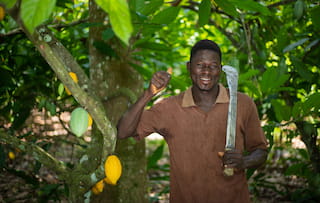Breakthroughs in tackling living wage and living income in global value chains

Making progress in the living wage and living income space is challenging. There are many roadblocks, diverse stakeholders, and siloed ways of working between sectors and across value chains.
Last week on the 26th June, over 400 key stakeholders from more than 250 organisations from global value chains came together at the Living Wage & Living Income Summit with optimism and energy to co-create change. The day was focused on sharing insights and tools and addressing common challenges through collective action. In the last session of the Summit, eleven different contributors inspired participants through their ‘news of the day’: milestones and innovations that are happening in the living wage and living income space, despite the obstacles.
Buyer's Guidelines: Voluntary Contributions to Support Living Wage Gaps
The session kicked off with new guidelines to support buyers in using the temporary measure of voluntary financial contributions with the end goal to positively influence workers’ wages. The guidelines also address the difficulty of ensuring that the contribution makes it to the worker. Are you a buyer keen to close living wage gaps?Scaling impact for living income in cocoa
Colruyt and Tony’s Open Chain co-presented progress on scaling impact for living income in the cocoa sector. Colruyt shared how they have created long-term commitments with specific farmer groups, comparing price with the Living Income Reference Price to the farmers in their supply chains, and highlighted how they are working with partners on many fronts (diversification, productivity, women’s leadership, quality, access to finance…) to scale up impact. Tony’s Open Chain celebrated its continued expansion with 18 new mission allies and 8 new farmer cooperatives being onboarded for the next year.Sustainability strategy with living income commitment
ofi announced its new sustainability strategy that sets out interconnected sustainability targets. ofi works globally in cocoa, coffee, spices and spices, nuts and diary. They have committed to a living income target of 200k farmers achieving a living income and 1 million farmers receiving enhanced livelihood support, both by 2030. Their commitment means long term capacity building and tailored support to farmers’ specific needs. ofi emphasised the importance of partnerships with other stakeholders to effectively tackle the immense task of eradicating poverty. Stating that one company alone will not be able to do this, while it said it would take up its part in it.New mechanisms to improve the livelihoods of tea workers
Collective action in tea by Taylors of Harrogate, Lipton Teas and Infusions, Twining’s, and Ahmad Tea in partnership with IDH has resulted in the development of a new mechanism to improve the livelihoods of tea workers. The mechanism includes a jointly agreed pro-rata based living wage differential. Lipton Teas and Infusions and Taylors of Harrogate celebrated during the summit the pilot of this mechanism with the following tea estates: Sasini Limited, Nandi Tea, Bogawantalawa Tea Estates and Lujeri Tea Estates.Promoting commitment to act at the board room
World Business Council for Sustainable Development shared news from the cross-sectoral and multi-stakeholder coalition of the Business Commission to Tackle inequality (BCTI). They explore three actions to address the inequality at the heart of business’ agenda for sustainable growth:- Elevating living wage and income at the board room together with the UN and 80+ BCTI Commissioners
- Deepening businesses ‘operational readiness to integrate living wage and income into their strategies, taking into account regional and industry market differences
- Promoting living wage and income alignment on definitions and standards including disclosures.
Value distribution in coffee and addressing farmer prosperity
JDE Peet's acknowledged the need for collective action with their announcement of collaboration with Global Coffee Platform, IDH and Solidaridad to identify opportunities to promote more fair value distribution. Find out more on this through the recently published report, ‘The Grounds for Sharing: a study of value distribution in the coffee sector’, by the Global Coffee Platform, Solidaridad Network and IDH. The report sheds new light on the challenges and approaches to value addition, creation and distribution.Principles of inclusion in advancing living income
Finally, Stephanie Daniels, co-founder of the Living Income Community of Practice (LICOP) rose onto the stage to announce the 5 principles of inclusion for advancing towards living income developed by LICOP, GIZ and IDH. The three organisations call on other organisations to join to action these principles. “Together, let’s take bold actions to transform these commitments into reality, harness the potential in the aspirational idea of living income, and driving meaningful progress for smallholder farmers globally.”
By giving these milestones and innovations a platform at the summit, IDH and GIZ aim to offer inspiration and support to companies along the journey of integrating social issues into their approaches, for better value distribution in global value chains.